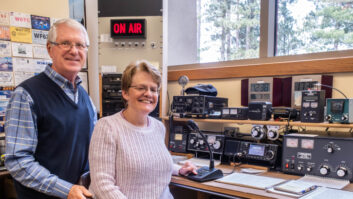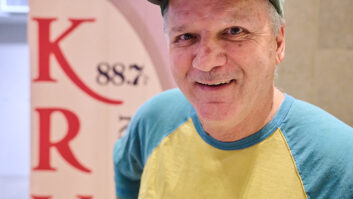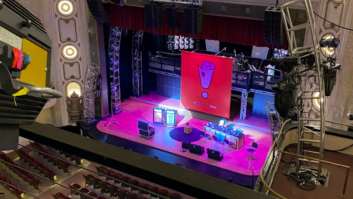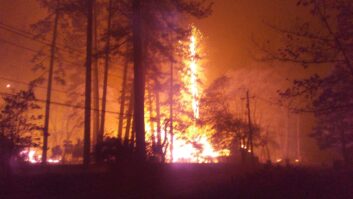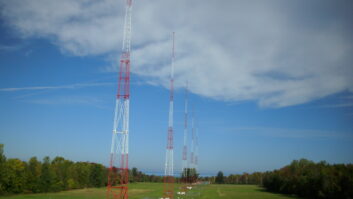SLAVE LAKE, Alberta — In May 2011, a fast-moving wildfire destroyed 40 percent of Slave Lake, a town of 6,700 people located in northern Alberta. Before it was brought under control, the fire incinerated homes, the library, the town hall, and the studios of Newcap Radio’s 92.7 The Lake FM, the town’s only broadcaster.
“The fire was unbelievable — like nothing I had ever seen before,” said The Lake FM Morning Show Host Paul Allen. “Giant plumes of thick smoke and fire in all directions; I mean, you couldn’t even see more than 10 feet in front of you in town due to the smoke … Insane wind speeds of up to 120 km/h (about 75 mph) also played a part in creating the perfect storm of conditions that made the situation uncontrollable.”
Despite the destruction of its facilities, The Lake stayed alive and got back on air quickly, providing Slave Lake residents with a critical informational lifeline.
Here is how they did it.
STUDIOS DESTROYED
The fires ripped through the town of Slave Lake on May 15, 2011. Despite the encroaching flames, the staff at The Lake kept broadcasting. But the next day, the flames were just too close for comfort, and a decision was made to evacuate the station and to remove its Axia Audio-based digital studio equipment.

The Lake FM has found a temporary new home for its studios in a minimall in Slave Lake.
That decision was made “about 20 minutes before the station burnt to the ground,” said Allen. “Before that, we were updating the town as best we could using our sources and contacts in the town, police and fire departments and fielding panicked phone calls. We [had] spent the majority of the two or three days leading up to the evacuation working pretty much around the clock at the station.”
As the The Lake studios went up in smoke, Newcap’s staff scrambled to keep residents informed. Fortunately, the The Lake Facebook page and website were kept current, thanks to the efforts of The Lake’s sister station CFXE The Eagle in Edson, Alberta, some 300 kilometers to the southwest.
However, Newcap’s priority was to get radio service restored to Slave Lake, one way or another.
LUCKY BREAK
“Our radio stations are grouped in clusters, and use a hub-and-spoke method to distribute digital audio and programming logs throughout the group,” said Owen Martin, director of engineering for Newcap West and The Lake FM’s senior technician. “Our digital playback system, dcsTools Xstudio, mixes very well with this approach and fortunately we maintain exact duplicates of all audio and logs at the hub location in Edson.”
Because of this setup, Martin and CFXE Assistant Program Director Kevin Zahara devised a plan to use the CFXE production studio as a temporary home for The Lake.
“We installed a copy of the Xstudio software on a production room computer and with the help of our IT group we were able to restore a streaming audio feed of the station during the night,” Martin said.
Of course, a streaming audio feed is only good on the Web. To be heard over the air, The Lake still needed to get a signal to its transmitter.
Despite the mandatory evacuation order, “We were able to ascertain that our transmitter plant, which is located about 15 kilometers north of the town on a mountain, was still intact,” Martin said. After spending a day pleading with authorities, the The Lake crew made it to the transmitter site — while the fire still raged outside Slave Lake.
Once there, “we first attempted to connect a wireless 3G network to receive our streaming audio from the temporary Edson studio,” said Martin. “Due to the limited coverage we abandoned that idea and switched over to a Tieline G3 system we had also brought along. Using a POTS connection we were able to establish a 21.6 kbps feed that proved extremely reliable. For the next 12 days we ran on this system without one dropout.”
“It was amazing actually, and made me appreciate the incredible technology we have today,” said Allen. “We were back up and talking to our listeners in Slave Lake on their radios, in a matter of days.”
RETURN TO SLAVE LAKE
It was not until May 28 that people were allowed back into Slave Lake. During that wait, The Lake’s technicians had assembled, configured and prewired a complete studio facility. Now all they needed was a place to install it in Slave Lake.
“We departed the morning of May 28th in vehicles loaded with all the studio gear we needed,” said Martin. “While enroute, a call came in from a couple who had recently purchased a large office building and had about 6,000 square feet available. Arriving in town and assessing the situation, we quickly agreed that this location would work well. By the afternoon of the 29th we had completed the installation of all of the equipment — including the new STL — and had swung the audio over to the local studio.”
Later that same day, The Lake FM’s staff returned to Slave Lake. On May 30, Paul Allen and his co-host Courtney Murphy were back on the air — doing their morning show live from Slave Lake.
“Today we are still working from those temporary studios with plans being developed to move into new digital studios in the near future,” Martin said.
Both Paul Allen and Owen Martin are brimming with gratitude towards the people who helped them keep The Lake alive during the fire. In addition to the staff at CFXE The Eagle, Allan can’t say enough about The Lake FM’s other sister stations: 94.1 FM The River in Athabasca, 93.5 Prairie FM in High Prairie, and CFOK in Westlock.
“They were crucial in assisting us in getting information onto their station websites,” said Allen. “The announcers there worked very hard to update their citizenry about what was going on. In fact, those towns organized and set up amazing relief/evacuee centers, and our sister stations were working hand-in-hand with those efforts.”
At Newcap, “our engineering department worked collectively day and night to find and fabricate anything needed,” added Martin. “Doug Mattice, Cliff Wheeler, Jim Elliott, Mike Fawcett went above and beyond to makes sure our station was returned to air as soon as possible. The programming department, Kevin Zahara and Rob Alexander, were exceptional in organizing and working with us. We were also amazed by the immediate outpouring of support from broadcasters across Canada. We received so many kind calls with offers of spare equipment and/or resources.”
THE FUTURE
As for the future? Although the fire is over and Slave Lake’s people have returned home, “It’s not all sunshine and roses,” said Allen. “There is a lot of work and rebuilding to be done, as well as getting temporary housing for the over 700 people who lost their residences in the fires.”
“Emotions are still running high for a lot of people,” he said. “However, in my opinion, Slave Lakers have a bond, a closeness, a sense of community that is much stronger than it ever was before. We are extremely grateful to everyone in Canada and worldwide that has generously donated time, money and efforts to help us recover. We will rebuild, stronger than ever.”





